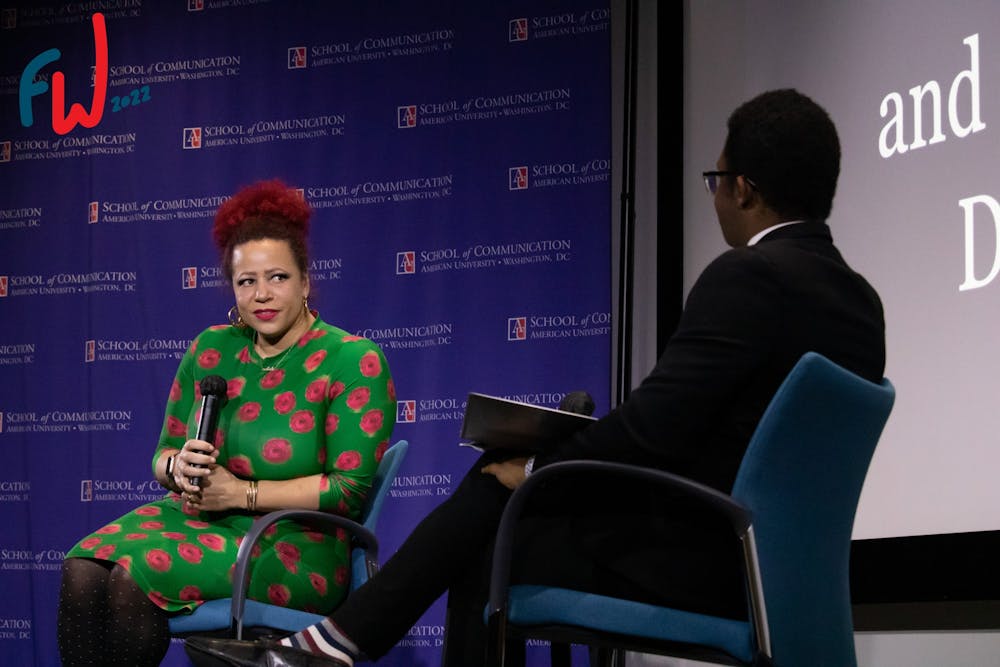As American University’s Founders Week celebration came to a close, Pulitzer Prize-winning investigative journalist Nikole Hannah-Jones discussed her work on the 1619 Project and the current efforts to ban certain materials in the teaching of history.
Founders’ “An Evening with Nikole Hannah-Jones,” co-hosted by the Kennedy Political Union, Women’s Initiative and the Sine Institute, was the first in-person KPU event since before the pandemic.
Hannah-Jones’s main focus of the event was her work founding the 1619 Project while at The New York Times. The project, which began in 2019 as a work of long-form journalism, marked the 400th anniversary of the arrival of enslaved peoples in the Virginia colony.
“Slavery and freedom were born at the same time here, but we only wanted to talk about one as being foundational to American identity,” she said.
Hannah-Jones argued that the ideals of the country were founded in 1619, rather than when the Declaration of Independence was signed in 1776. With this, the project works to highlight the effects of slavery and the contributions of Black Americans in the country’s history.
“You don't get 1776 without 1619,” Hannah-Jones said.
The 1619 Project has come under criticism, as some think the project works to replace the events of 1776 when America declared independence. However, Hannah-Jones said it’s important historians continue to find complex sources and interpretations of history to better understand American society as it is today.
Along with these criticisms were attempts to defund the teaching of the 1619 Project in schools. In a bill introduced in June 2021, Republican Sens. Mitch McConnell and Tom Cotton said that the 1619 Project is a “distortion of American history.”
When federal efforts to defund the teaching of the 1619 Project failed, Hannah-Jones said attention was moved to state legislatures.
Hannah-Jones said she believed “anti-critical race theory” bills to be an attempt to deter the momentum of white support behind the Black Lives Matter movement. Hannah-Jones called these “anti-history” bills.
Critical race theory is a legal theory exploring the institutions of power from a race-based perspective.
For Hannah-Jones, the teaching of Black American history in schools should not be labeled as critical race theory. The efforts have led to the banning of curriculum and certain books in K-12 schools. But rather than controlling what is being taught in schools, Hannah-Jones said it’s about controlling the narrative of history — critical race theory is not taught in K-12 schools, as it is an advanced legal theory.
“History is how we think about ourselves as a society,” she said. “You have a group of people who are used to always being the heroes in the story, the victors, and now we're having to comprise a more honest and a much uglier truth, and they don’t want to.”
In addition to understanding 1619 as the foundational year of America, Hannah-Jones said America was not a true democracy until the Voting Rights Act was passed in 1965. Before then, she says America was an ethnocracy, a democracy for just white Americans.
“Now we have to grapple with a multiracial democracy that we actually never had before. And it has been contested every step of the way,” Hannah-Jones said.
Hannah-Jones also discussed how her efforts to develop a more comprehensive view of U.S. history has affected her career as a journalist. In 2021, when she was appointed to the Knight Chair in Race and Investigative Journalism at the University of North Carolina, the board of trustees initially denied her tenure due to the controversy surrounding the 1619 Project. When the board reversed their decision, she turned down the position.
“It was one of the best moments of my life,” she said. Hannah-Jones said she didn’t want to stay at the institution which treated her, or other Black faculty, poorly.
Hannah-Jones warned students that America’s democracy is deteriorating. She encouraged students that, along with staying hopeful, they should take action and “refuse where the country is going.”
“We have the power to shape our society and we have the power to push back on these laws,” she said. “We have the power to ensure that our democracy will hold; they cannot take it from us without our permission.”





